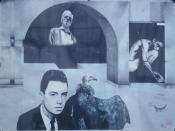In "The Guest" Albert Camus uses irony to convey the existential theme of making what you believe to be the moral choice regardless of the consequences. This theme reflects Camus' existential philosophies, stressing free choice and responsibility for one's actions in addition to the inevitability of death. This philosophy plays a major role in the theme and structure of this story, and stresses the individual's unique position as a self determining agent responsible for the authenticity of his or her choices. In the short story, Daru has several choices to make. He can either deliver the Arab to prison, obeying the government's orders but angering and isolating himself from his community, or he has the choice to set the Arab free, pleasing his community but going against the orders of his government. Both of these choices will most likely result in Daru feeling guilt and angst. However, not making a choice is also an option for Daru.
He could allow the Arab to make the choice for himself resulting in, theoretically, no angst and no conflict. The irony within the story lies within these choices and the choice Daru ultimately makes.
There are three ironies of situation. The first one occurs when Daru makes his decision. He gives the Arab money and food, and opts to allow the Arab choose his ownMontgomery 2fate, giving him two choices: "Now look," the schoolmaster said as he pointed in the direction of the east, "there's the way to Tinguit. You have a two-hour walk. At Tinguit you'll find the administration and the police. They are expecting you." The Arab looked toward the east, still holding the package and the money against his chest. Daru took his elbow and turned him rather roughly toward the south. At the foot of the height...



Excellent Job
Good Work you have exemplified all the prevalent idea's in a well fashioned manner.
0 out of 0 people found this comment useful.